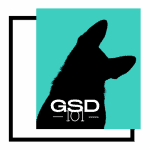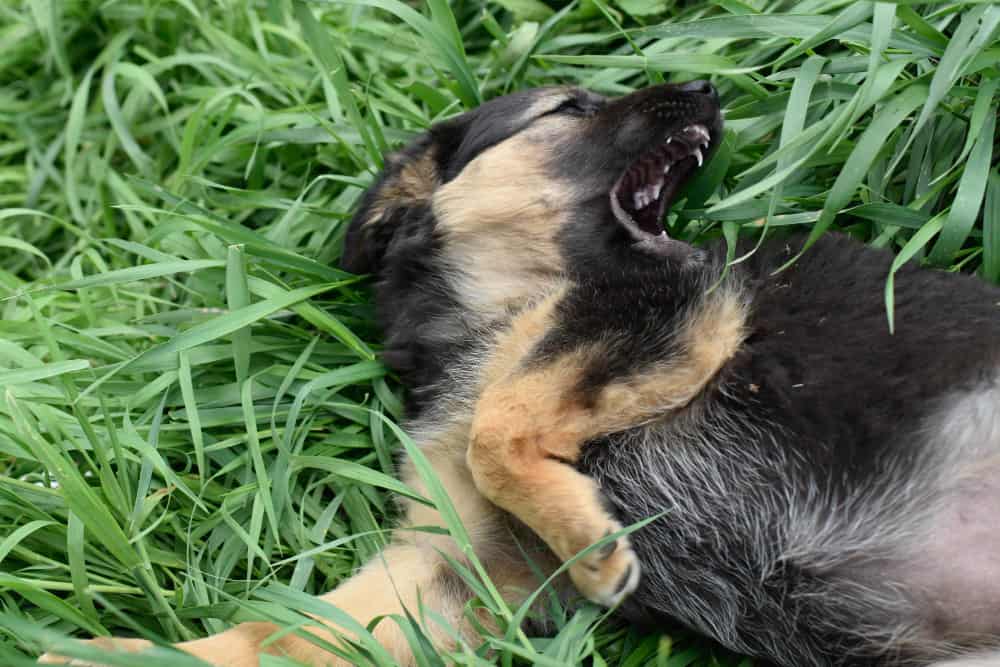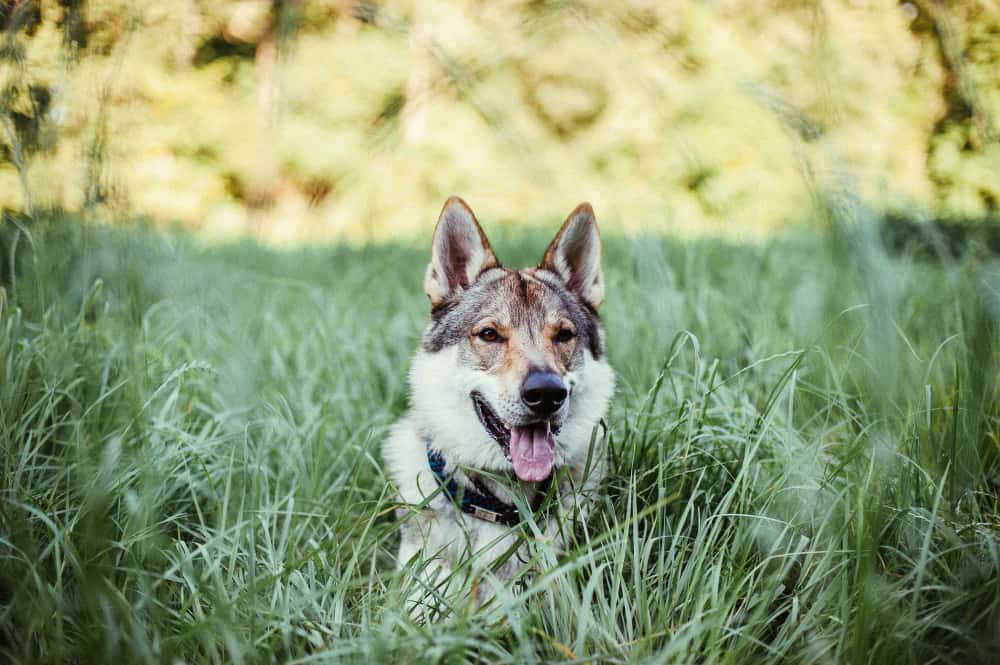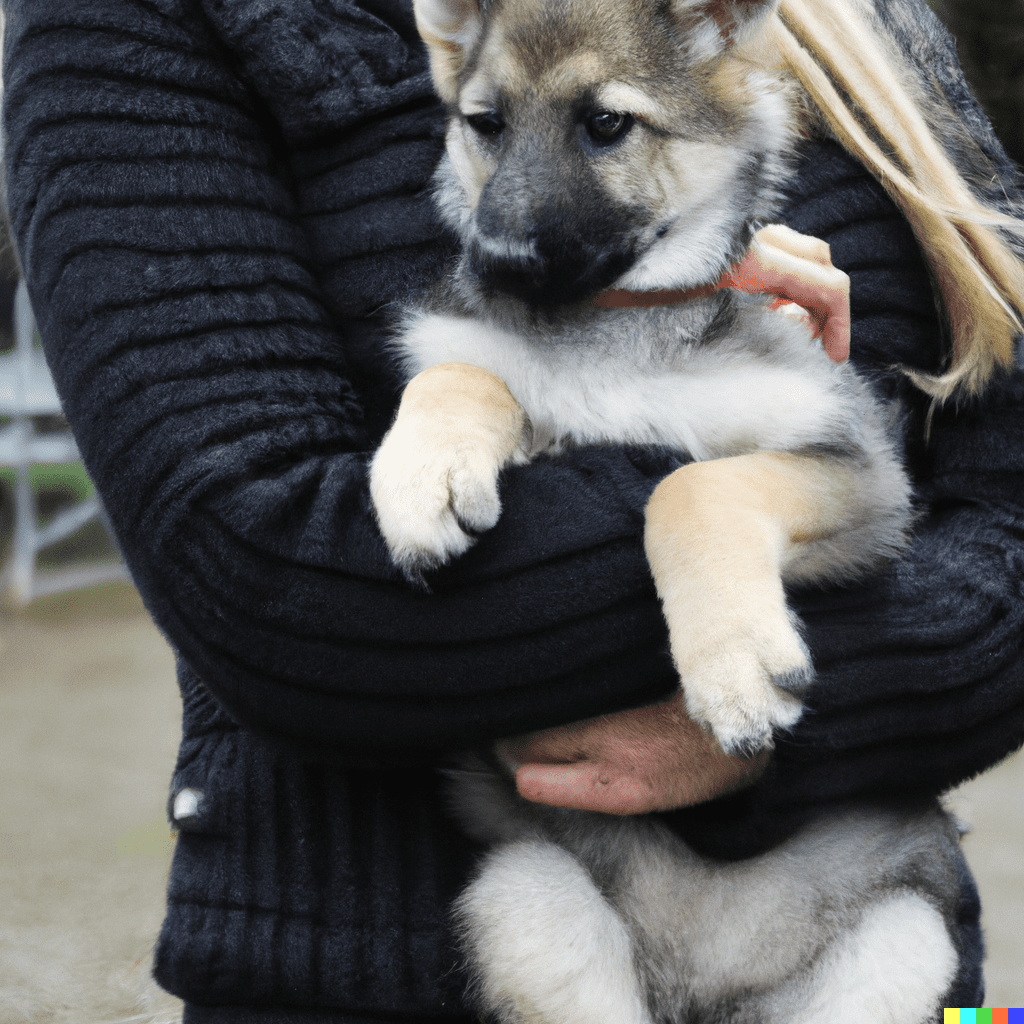Is your puppy actually aggressive or is he’s just afraid? Since he’s a German Shepherd, is he just being protective? Sometimes, however, a GSD puppy is born with neurological issues and aggressive behaviors occur very early in life, prior to 6 months of age. Aggression is certainly complex, but it can typically be resolved with patience, consistency, and proper management.
German Shepherd puppies who exhibit truly aggressive behaviors are rare. Aggression is typically a learned behavior and while negative associations can occur quickly and lead to aggression quickly, most GSD puppies are quite resilient prior to adolescence.
A GSD puppy who’s showing aggressive behaviors may not actually be aggressive – but how can we tell? What kind of body language should we be watching for, what kind of things should we be looking out for early on?
More posts on German Shepherd aggression
Why Is My German Shepherd Suddenly Aggressive Towards Me?
Why is My GSD Suddenly Aggressive Towards My Husband?
Why Is My German Shepherd Aggressive Towards Strangers?
Will A German Shepherd Attack an Intruder Untrained?
How to Stop Food Aggression Towards People in German Shepherds?
How To Tell If a German Shepherd Puppy Is Aggressive
The word “aggression” gets tossed around often, usually describing when a dog behaves in a manner that is unwanted to the owner.
GSDs get labeled “aggressive” when they show their teeth, raise their hackles (piloerection), bark, or even just use their teeth in any way.
Just because your GSD puppy shows his teeth with his hackles up, doesn’t necessarily mean that he’s aggressive – what it does mean though, is that he is experiencing an emotion, reacting to something in his environment.
Genetics, learning history, and environment all play a role in behavior. Here are the four questions you can ask to get the full picture:
#1 What kind of information has the breeder or rescue organization given?
At the first signs of aggressive behavior, it’s important to check in with your puppy’s breeder or with the rescue organization that he came from.
Has the breeder become aware of other puppies in that litter showing aggression? What information do they have on the bitch’s pregnancy? Does the rescue have any information on either of those things?
If the mom had a stressful pregnancy or other pups in the litter are showing aggression as well, there’s a chance that your GSD puppy was born with neurological issues or under stress, causing anxious puppies.
#2 When do the aggressive behaviors occur?
Identifying WHEN these behaviors occur, can help us to determine WHY.
Once we know WHY we can work on HOW to rectify them. Is your GSD puppy showing aggression only when there are items of value nearby, like toys or bones? When do other dogs walk by your house? When his food bowl is present?
Keep a puppy behavior diary – make notes of when you see behaviors of concern so that we can identify those specific environments.
If after diary taking we notice that the puppy is showing aggression during random times in random places, it’s definitely time for a vet visit to rule out underlying medical issues.
#3 What behaviors are you seeing that seem aggressive?
GSD puppies are typically fantastic communicators – they are born with the ability to use body language to express themselves to us and to each other.
A fearful puppy may show his teeth, pin his ears, piloerection, growl, whale eye (show the whites of his eyes in a doggy glare) but keep his distance.
He’s expressing to whatever it is in his environment that he’s uncomfortable and would like some space.
More aggressive behaviors are similar to the above but they are much more inclined to break that space bubble and move in to make contact with the threat.
#4 How long does it take for the GSD puppy to return to “normal”?
After a GSD puppy has growled or shown his teeth, maybe he’s made contact with another dog or a person with his teeth, how long does it take for him to be able to return to normal?
After a stressful incident, most puppies can “shake it off” with an actual shake, then move on.
However, a GSD puppy who is struggling with anxiety, pain or neurological issues, may take several hours or days to return to their normal state.
These puppies require veterinary assistance to look further into WHY – a Veterinary Behaviorist who is qualified in both behavior and medicine.
What Should I Do If My GSD Puppy Becomes Aggressive Towards Me?
It is not only scary and upsetting after your GSD has become aggressive with you, but very confusing. It is very common for a “land shark” GSD puppy to not have a lot of bite inhibition yet.
They use their teeth for everything, especially while interacting with their people. In most cases, your GSD puppy is just a typical, mouthy puppy – they’re still just learning how much pressure is ok.
If you are feeling unsafe and uncomfortable around your puppy and feel like he could hurt you, it’s best to stay as calm as possible – do not yell or hit your puppy.
Encourage him to go into his crate and get him into the car and to the vet for professional help to rule out any medical issues first.
Should I Make an Appointment with My Vet If I See Aggressive Behaviors from My GSD Puppy?
The short answer is YES. Whenever you see the behavior of concern, especially in a puppy, the very first thing to do is to see your veterinarian to rule out any chances of an underlying medical issue – medical trumps behavior, always.
A GSD puppy with an ear infection could lunge at you for being near his food bowl – he’s not “aggressive” he’s in pain.
A GSD puppy could react with barking and snarling while on leash towards people and other dogs because his collar hurts his neck – he’s not aggressive, but he’s uncomfortable.
Ask your vet for assistance in finding the best harness for his body shape.
If I Hire a Trainer, What Kind of Questions Should I Ask Before Starting?
The dog training industry is completely unregulated – that means that anyone can claim to be the next “expert” without any kind of proof of quality education or experience applying that education.
Anyone who makes the recommendation that you should be the “alpha”, “pack leader” or “the dominant one” is practicing debunked theories from decades ago and is not qualified to help you.
Ask them what their training methods are and what you can expect from your first session with them.
Look for answers that involve following humane methods based in behavioral science and a plan for your first session to be about collecting information and creating a plan rather than just “training” your puppy.
My GSD Puppy Comes from Very Strong Protection Lines, Is He Just Doing His Job?
A GSD, even as a puppy, can certainly have great instincts to begin to protect his family and his environment – however, he does not yet have appropriate experience under his belt to know what to do with possible threats.
It’s important to watch for body language – is he growling to alert you of someone new with neutral ears, tail and feet or is he growling with a raised tail, weight on the front feet more so than the back, unable to hear his name or break his focus on the person?
Any kind of intense behavior from a puppy needs to be taken seriously so that they don’t increase to actual aggression.
What Do I Do If My GSD Puppy Is Aggressive Towards My Older Dog?
Like most GSD puppies, they play, eat and sleep hard. They are all over the place running, biting and bouncing – most older dogs are not fans of this “childish” behavior.
If your older dog is constantly correcting the puppy but he isn’t listening, redirect him to a different activity and offer your older dog a separate place to rest.
If you have a friend or neighbor with a healthy, stable dog that could teach your GSD puppy how to play, this is always best.
If, however, your GSD puppy is hurting your older dog – biting legs and neck to the point of drawing blood or causing a fight between them, separate them immediately and book that vet visit.
What Do I Do If My GSD Puppy Is Aggressive Only Towards Children?
When it comes to children and dogs of any age, there is no grey area. Is your (or any) child safe with your puppy? If the answer is no, if you feel that your GSD “doesn’t like” children, they first must be separated – whether this means using baby gates or crates, different rooms, etc.
You will then need to contact a qualified Canine Behavior Consultant, not just a trainer, to help you. In a 2013 PubMed Central study, “children younger than 18 years who sought medical attention after a facial dog bite between January 1, 2003, and December 31, 2008″, were included.
ALSO READ: How to Introduce My Child or Grandchild to a German Shepherd Dog/Puppy Safely?
Demographic and epidemiologic data were collected and analyzed. A total of 537 children were identified. The average age was 4.59 ± 3.36 years, with a slight male preponderance (52.0%). The majority of dog bites occurred in children 5 years of age or younger (68.0%). Almost all (89.8%) of the dogs were known to the children.
When circumstances surrounding the bite were documented, over half (53.2%) of the cases were provoked.”
Is Euthanization My Only Option If My GSD Puppy Is Deemed Aggressive by a Professional?
Truly aggressive GSD puppies are rare – however, it happens.
Sometimes even the most educated professionals and the best medications cannot help the puppy and if we’re seeing actual aggression (which often includes a bite history), euthanasia is the most humane and most responsible option.
Qualified professionals will not recommend euthanasia lightly – they will do everything they can to ensure that underlying medical issues or specific contributing environments are ruled out.
Conclusion
In conclusion, truly aggressive GSD puppies are rare – but not impossible. Keep a puppy diary of concerning behavior, noting WHEN and WHERE it occurred and WHAT it looked like. Hire a qualified behavior consultant to help you figure out the WHY to prevent it from getting worse.
Further Questions
Will My Breeder or Rescue Organization Take My Aggressive GSD Puppy Back?
Reputable breeders and rescue organizations WILL take your GSD puppy back – it will be part of your contract. Be sure, when looking to purchase or adopt a GSD puppy, to ask about their contracts to make sure that you are covered.
Can Aggression in GSD Puppies Be Fixed?
If the aggression is based in fear, which it typically is – yes, with the right professionals on your side, your GSD puppy can live a normal and happy life. Fear is complex and time-consuming to work through but it can be done!
Can An Aggressive GSD Puppy Be Rehomed?
If the qualified professional you’ve reached out to has determined that your GSD puppy’s aggressive behavior is not neurological or genetic, that it’s due to his environment (busy household, hectic schedule, lack of training/consistency, etc) then yes, he can be responsibly rehomed.
More posts on German Shepherd Puppies
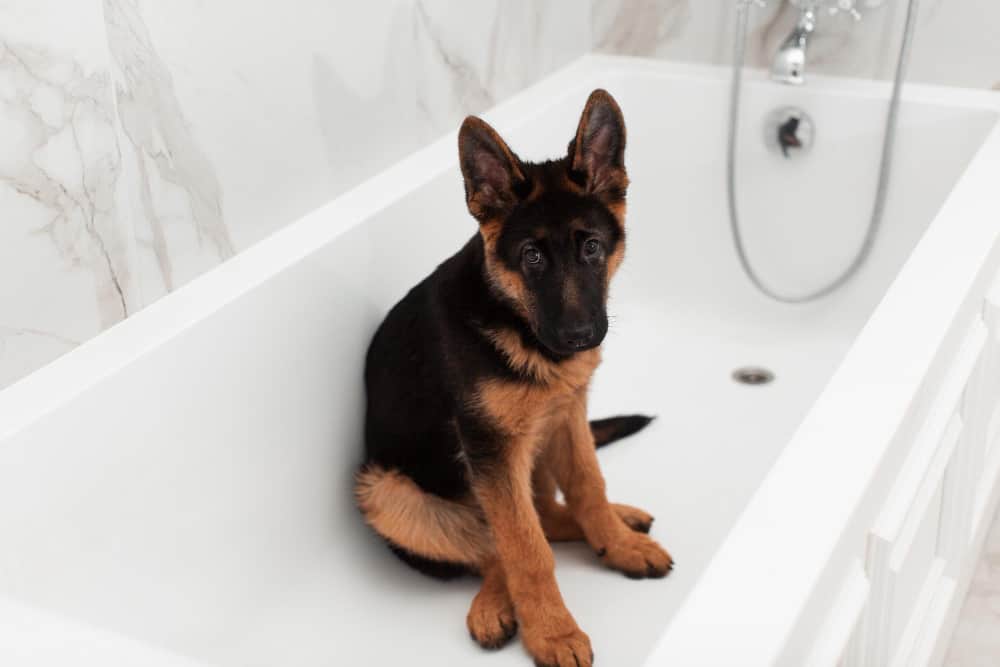
Recommended post
German Shepherd Puppy – The Ultimate New Owner’s Manual
Health and care
- German Shepherd Puppies: Everything You Need to Know
- Bringing Your German Shepherd Puppy Home for the First Time
- How Much Does A Purebred German Shepherd Puppy Cost?
- $500 German Shepherd Puppy For Sale: Does it Make Sense?
- German Shepherd Puppy Crying: Owner’s Guide
- How to Stop GSD Puppies From Biting: 7 Owners-Proven Tips That Work
- When Will My German Shepherd Puppy’s Ears Fully Stand Up?
- German Shepherd Puppy Sleeping Guide: Everything You Need To Know
Training, socialization, and behavior
- 10 Best Training Tips for German Shepherd Puppy
- German Shepherd Puppy Socialization: A Beginner’s Guide
- How To Tell If a German Shepherd Puppy Is Aggressive
Feeding
- How Much Does an 8-Week-Old German Shepherd Puppy Eat in a Day? A Feeding Guide
- How Much Does a 3-Month-Old German Shepherd Dog Eat in a Day? A Feeding Guide
- How Much Does a 6-Month-Old German Shepherd Dog Eat in a Day? A Feeding Guide
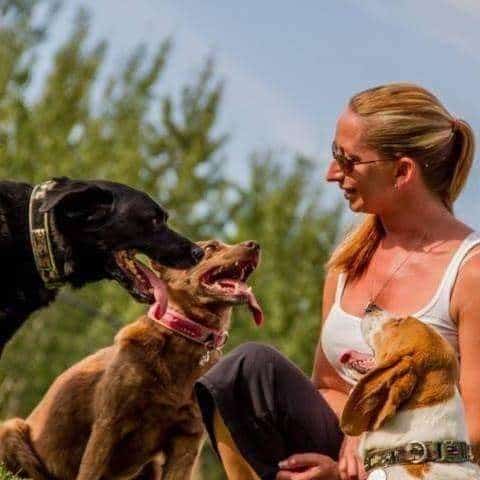
Sheila Gunston holds a Canine Behavior Science and Technology Diploma with an aggressive behavior specialization, is an Accredited Professional Canine Behavior Consultant with the PPAB, and a Doggone Safe “Be a Tree” Presenter. Sheila specializes in aggression and other complex behaviors.
